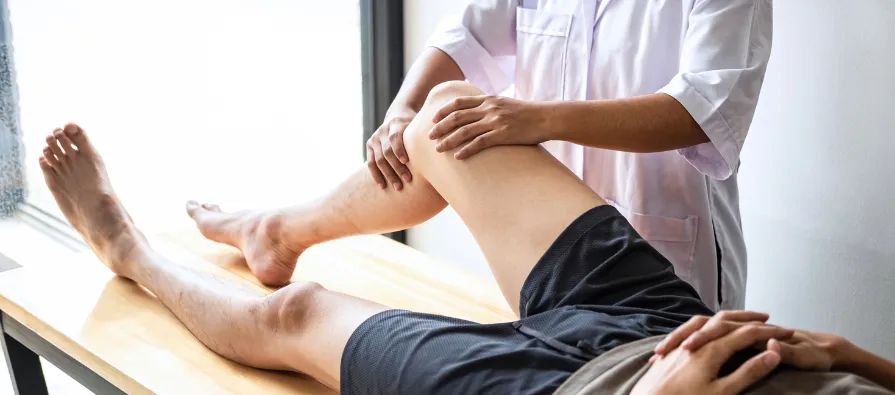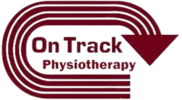On Track Physiotherapy
ACL Rehab in Ann Arbor

ACL Rehab in Ann Arbor: Your Path Back to an Active Lifestyle
Has an ACL tear sidelined you from the activities you love? Are you an athlete, a weekend warrior, or just an active person hoping to regain stability and get back out there again? Then ACL rehab with the experts at On Track Physiotherapy is for you.
Our structured ACL rehab program focuses on reducing pain, restoring knee movement, rebuilding strength, retraining balance, and safely progressing back to your active lifestyle after an ACL injury. Unlike basic physical therapy, our specialized approach tailors the program to your unique needs and goals—whether it’s playing sports again, keeping up with your kids, exercising comfortably, or pursuing any other activities ACL damage may have taken from your life.
Is ACL Rehab Right for You?
ACL tears can happen to anyone but tend to occur most often in:
- Athletes who play pivoting sports like football, basketball, soccer, and skiing
- Women aged 16-25 (who face a higher risk of ACL tears than men)
- Those with previous knee injuries
- People over age 40 whose ACLs have weakened over time
No matter the cause, an untreated ACL tear can result in continuous knee pain, instability, impaired movement, and increased potential for further injury down the road.
That’s why if you’re experiencing any of the following, ACL rehab may help:
- Pain, swelling, or instability in your knee
- Difficulty walking, running, kneeling, or bearing weight
- Noticeable “giving way” sensations in your knee
- Inability to return to activities you previously enjoyed
- Concern about protecting your knee from future damage
Rehab combines targeted strengthening exercises, proprioceptive training, pain management techniques, and more to rebuild stability, restore function, eliminate pain triggers, and get you moving confidently again.
A customized program focused on your unique objectives, whether they be playing basketball, running 5Ks, hitting the slopes, keeping up with family, or returning to daily work pain-free, helps you recover not just basic capabilities—but the activities that matter most, whatever they may be.
How ACL Rehab and Recovery Works
After an initial exam and assessment, our therapists work with you to create a personalized recovery plan tailored to your needs. While programs vary based on factors like injury severity, activity goals, and more, you can typically expect:
Stage 1: Early Rehab (1-2 Weeks)
Early rehab focuses on:
- Controlling pain and swelling
- Regaining initial mobility and range of motion
- Activating muscles surrounding the knee
- Achieving the ability to walk and perform basic functions
We’ll employ techniques like ice, compression, elevation, electrical stimulation, and therapeutic exercises to reduce swelling while beginning gentle knee movement. The goal is to lay an initial foundation before progressing.
Stage 2: Mid-Rehab (2-6 Weeks)
Mid-rehab continues to progress on:
- Improving mobility and motion
- Eliminating swelling
- Building leg muscle strength
- Enhancing balance and stability
Targeted exercises grow harder over time, strengthening your hamstrings, quadriceps, hips, and core—key to supporting your knee for daily life and sports. You’ll also retrain proprioceptive abilities through agility exercises, improving awareness and control.
Stage 3: Advanced Rehab (6-12 Weeks)
The final phase aims to:
- Build power and endurance enough for activities
- Refine balance, agility, and neuromuscular control
- Establish sport-specific capabilities
- Perform movements essential to your goals
Advanced drills focus on sport or activity-specific training to rehearse pivot movements, jumps, and more as you rebuild confidence to execute them safely. We’ll also recreate increasingly intense simulation scenarios to challenge your knee. The goal? Are you ready to resume your desired activities by discharge?
Throughout the entire process, therapists continually assess progress, modify programs based on improvements, and collaborate with physicians managing your case. We’ll keep you and your doctor updated on your improvements to ensure you receive fully aligned care.
Benefits of Customized ACL Rehab
Research shows ACL rehab programs incorporating early motion, progressive strength training, neuromuscular adaptation, and activity-specific training facilitate better outcomes and readiness to resume previous capabilities.
Patients who complete evidence-based rehab can expect:
Reduced Pain and Restored Stability
- 93% decreased pain during daily activities
- 87% reduction in “giving way” sensations
- Up to 72% increase in overall knee stability
Rehab targets the pain and instability ACL injuries cause through strengthening exercises, balance training, and more. Over time, most patients achieve a stronger, steadier, less painful knee.
Regained Mobility and Flexibility
- 91% restoration of full range of knee motion
- Increased flexibility allows comfortable sitting, squatting
Stretching exercises improve flexibility while scar tissue management maintains motion—together combatting common post-injury restrictions.
Enhanced Strength and Proprioception
- 5x increase in hamstring strength
- 83% improved proprioceptive abilities
- Up to 2.4x increase in quadriceps strength
Targeted strengthening builds up the muscles surrounding the knee joint, increasing support and control during movement. Proprioception training also helps prevent future injury.
Safe Return to Activities
- 94% able to return to some sports participation
- 73% successfully resuming pre-injury level of sports
- 80%+ return to pain-free regular activity
Rehab eases you back into activities through simulation, building confidence and ability step-by-step. The tailored approach aims to get you doing what you love once more.
Frequently Asked Questions
What is the average rehab time for a torn ACL?
Most patients attend ACL rehab for 6+ months though some progress quicker based on injury severity, pre-existing fitness level, individual healing, and other factors. We continually tailor timeframes to meet your goals while avoiding overexertion that risks re-injury. Patience pays off.
What activities should be avoided during ACL rehab?
Avoid any activities causing sharp pain until cleared by your treatment team as they may impede healing. We’ll provide guidelines on when you can return to light exercise like walking or swimming versus pivoting activities. Through each stage, we determine appropriate activities—modifying as you improve.
What does a typical timeline look like for a full ACL recovery?
While timeframes vary, below offers a general outline:
- Early Stage (1-2 weeks): Focus on controlling swelling and pain while allowing gentle knee movement in a brace without bearing full weight. Use crutches if needed.
- Mid Stage (2 weeks onward): Progress range of motion while introducing muscle strengthening and balance exercises without compromising the knee. Build towards weight-bearing activity.
- Advanced Stage (6 weeks+): Continue exercises while restarting light cardiovascular activity (biking, swimming, etc). Slowly ease back into more dynamic movements prepping for sports participation.
- Final Stage (6+ months): Advance neuromuscular training for stability during pivots, jumps, or harder tasks. Slowly reintegrate desired activities under guidance to confirm full recovery and confidence.
The precise timeline changes per the individual. We’ll provide estimates and milestones tailored to your needs while avoiding overexertion. Consistency and patience are key.
On Track Physiotherapy’s ACL Specialists Are Here to Help
Dr. Morgan Kennedy, PT, DPT brings years of rehabilitating orthopedic injuries using the latest evidence-based practices tailored to each patient’s lifestyle goals. Whether you’re eager to return to the basketball court or just walk the neighborhood pain-free, you will receive a customized program designed to get you back out there safely.
Take Control of Your Recovery Today
If an ACL tear has disrupted your active lifestyle, contact us today to evaluate your knee, develop a comprehensive recovery plan, and discuss how we can collaboratively help you meet your post-injury goals, whatever they may be.
Call us or book an appointment today to get started. We look forward to helping you regain stability, rebuild strength, eliminate pain, and restore the activities you love.
About the Author
Dr. Greg Schaible, a licensed Physical Therapist, empowers patients to unlock their full potential in Certified Strength & Conditioning and Sports Rehab. Years of experience fuels his passion for helping individuals reclaim vibrant lives. At On Track Physiotherapy in Ann Arbor, Dr. Greg Schaible combines innovative techniques with personalized care, tackling a broad spectrum of physical challenges.


